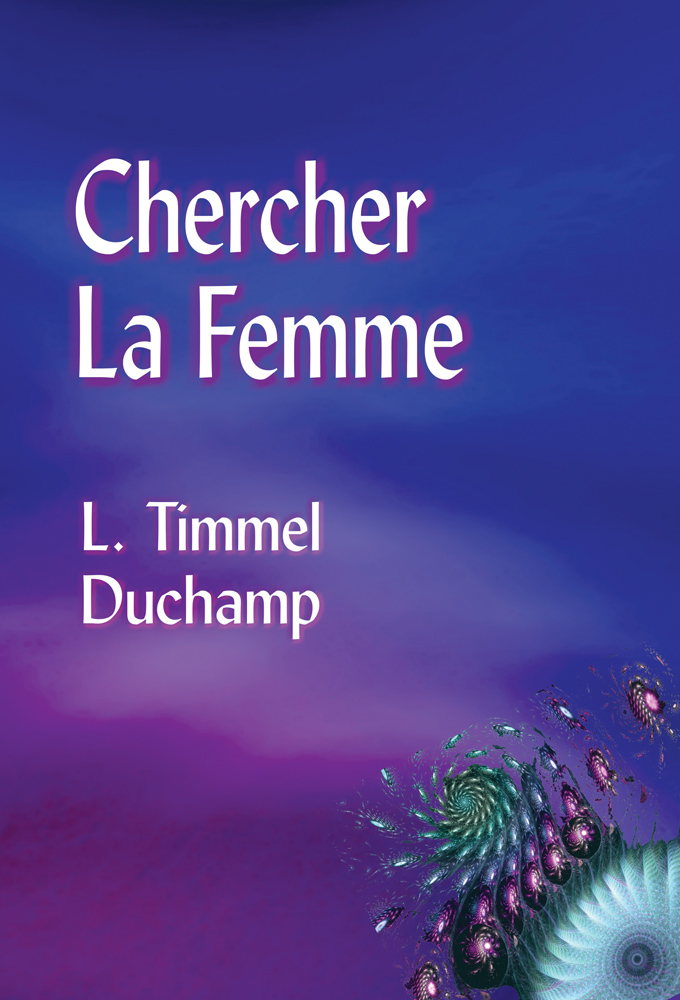Chercher La Femmeby L. Timmel Duchamp
2018 Tiptree Award Honor List
"Everything about the humanoids inhabiting the planet La Femme is beautiful and desirable. Even their names are a pleasure to the tongue, a pleasure that can be experienced only in meat space."They named the planet "La Femme" and called it a paradise and refused to leave it. Now Julia 9561 is heading up the mission to retrieve the errant crew and establish meaningful Contact with the inhabitants. Are the inhabitants really all female, as the first crew claimed? Why don't the men want to return to Earth? What happened to the women on the crew? And why did Paul 22423 warn the First Council to send only male crew members?
Advance Praise
Chercher La Femme, which unfolds in a strange, complex, alien future,
effectively explores several themes: of personal identity and how it
holds itself together but is also porous to experience; of
communication with alien life forms and how amorphous and challenging
that might be; and of the visceral power of alien forms of beauty and
art, giving the story compelling depths. The tense stretch between the
Pax and the "Outsiders" offers an interesting representation of the
real-world tension we now live with, between low-tech societies and
those racing to colonize outer (and inner, personal) space in all
sorts of ways. ReviewsAqueduct editor Duchamp's concentrated and demanding examination of what's accepted as "self" is cleverly and convincingly presented as a simple piece of science fiction. Diplomat Julia, a member of a socialistic human society known as the Pax, is the head of a mission to a far-off world, La Femme. The mission's primary purpose is recovery of the first ship sent to make contact with La Femme's inhabitants, though further diplomatic advancement is planned as well. Julia is distracted from the mission objectives by her deep analysis of her life thus far and the utopian ideal she lives by, particularly when she deals with her splintered crew. What she and her crew find upon arrival is enough to shake them all. Duchamp (Stretto) makes abundant challenges to gender norms and raises questions of what constitutes alienness, and the novel's humanistic approach and unwavering commitment to Julia's frank introspection go beautifully with a precisely detailed world. This thoughtful tale bears rereading and contemplation. —Publishers Weekly, June 2018 One of my favorite devices for SF stories is the alien race whose society presents a puzzle to humans. In this case, an expedition of men arrives on a planet whose inhabitants all appear to be women, and unusually beautiful ones as well. But this is not a variation of some 1950s cheaply made SF exploitation film. There is some subtle and intelligent examination of gender roles as well as a touch of philosophy about the limits on human ability to comprehend the universe, but none of that detracts from what is also a nicely constructed puzzle story. This was a surprisingly fast read. (Read the whole review) —Critical Mass, Don D'Ammassa, Aug 19, 2018 The unintelligibility that is the
substance of the novel sometimes bleeds into its form. Duchamp is dealing with
a set of concepts that do not yet exist as part of our store of common knowledge,
and she is virtually compelled to invent a private language to describe them.
This runs the risk of creating situations where the reader lacks even the basic
tools that are required to imaginatively construct what is not – or cannot – be
described in the novel itself. The use of the word ‘transudation’, that cannot be
further broken down, and by itself, suggests nothing, is a good example of this.
ISBN: 978-1-61976-147-6 (13 digit)
|

